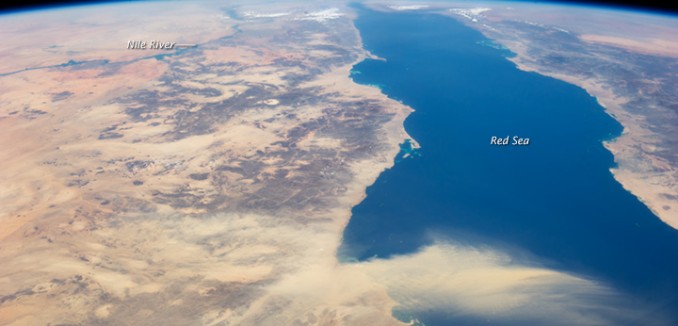Iranian Navy Commander Rear Admiral Habibollah Sayyari said that Iran plans to maintain its naval presence in international waters, especially the Gulf of Aden and the northern Indian Ocean, Farsnews reported Tuesday.
“The Islamic Republic of Iran’s Navy has deployed in the North of the Indian Ocean and the Gulf of Aden and this presence will continue forever,” Sayyari said.
His statement confirms reports that Iran sees the Red Sea as a strategic central region in the Middle East, especially for gaining a foothold in the heart of the Arab security zone. The strategic shipping region is at the crossing of continents and connects, via the Suez Canal, between the Mediterranean Sea (and thus Europe and North Africa) and the Indian Ocean – gateway to Africa, the Gulf and Asia.
The importance of this region impacts much of the turmoil taking place today in the Middle East, especially Iran’s involvement in Arab nations.
The current war is Yemen has reawakened the Arab countries’ security concerns over Iranian adventurism. These concerns have been aggravated by reports of suspicious Iranian movements in the Strait of Bab-el-Mandeb, linking the Red Sea at its southern edge with the Indian Ocean, and in light of Iran’s support for the Houthi Shi’ites, who have taken control of many power centers in Yemen. The strengthening of the Shiites in Yemen is especially worrisome for nearby Egypt and neighboring Saudi Arabia, both of whom see it as part of another Iranian attempt to take control of the Red Sea region.
A recent investigative report in the pan-Arab newspaper Al-Arab (Arabic link) looked at Iran’s stepped-up activity in the Red Sea region. Egypt recently identified two Iranian warships moving in the Gulf of Aden, a busy international shipping traffic route near the Strait of Bab-el-Mandeb that is frequented by oil ships. Egyptian sources said that Cairo recently strengthened its maritime capabilities in order to remain the most powerful naval force in the Middle East. It has added several new ships to its fleet and submarines from Germany. Egypt has also signed an agreement with France to build five naval destroyers, of which one is being built in France and four at Alexandria’s naval base.
Egyptian sources said that what is happening at the southern entrance to the Red Sea is an attempt by Tehran to test the response of the Egyptians and Saudis, as well as U.S. forces. They say that Iran’s military power relies on two types of weapons – long-range missiles and naval power in the Persian Gulf and the Red Sea. Intelligence reports show Iran’s intentions in increasing its presence in the Gulf of Aden, as well as its success in secretly building a naval base at the port of Asab in Eritrea on the Red Sea.
Egyptian political science professor Tarek Fahmi said that Tehran is trying to expand its influence in areas that are of strategic importance for Egypt. He said Tehran was able to generate a presence on Egypt’s border in the Gaza Strip through its connections with Hamas and Islamic Jihad, and in Lebanon through Hezbollah. Now it wants to establish its presence in the Red Sea, through the Houthis in Yemen. Iran’s generous investments allow it to strengthen its relations with the Nile Basin countries as it tries to establish Shiite cells and exploit the poverty in these countries.
“Tehran aims to expand its influence in the Arab sea lanes, particularly in the Persian Gulf and the Red Sea,” Fahmi said. Its movements in the Horn of Africa have a significant effect on the Egyptian and Saudi presence in the region. There is strong cooperation between Cairo and Riyadh to reduce these movements before it’s too late, Fahmi said.
Fahmi also believes that Iranian support for the Houthis has become a major danger for the Suez Canal area, especially amid the area’s growing importance as an axis of economic and strategic development for Egypt, which recently announced a mega-project to build a second canal parallel to the existing Suez Canal. The Egyptian government takes the issue seriously and even hinted that there is a military option on the table, if necessary, because this area is a strategic issue which it believes cannot be compromised.
Egyptian sources said that security forces in Cairo began to warn of Iranian threats to the territorial integrity of Saudi Arabia following Tehran’s success in establishing itself as a major player in Yemen, Saudi Arabia’s neighbor. Riyadh took the warnings very seriously and increased its cooperation with Cairo to counter the Iranian moves.
[Photo: Public Domain]




